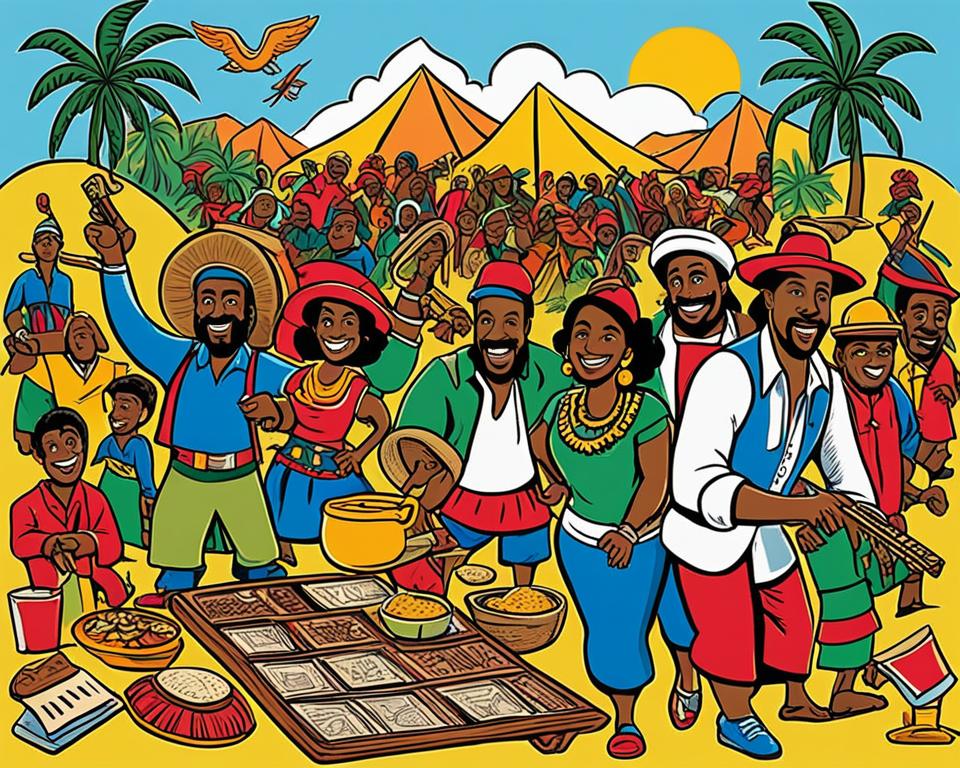The film industry in Haiti is relatively small and still developing, facing various challenges that limit its growth and visibility. Despite this, there are several movies that have been made about Haiti or set in the country, providing a glimpse into its rich culture, history, and pressing issues. In this article, we will explore some noteworthy films and discuss the challenges faced by the Haitian film industry.
Key Takeaways:
- Movies about Haiti and Haitian films offer insights into the country’s culture, history, and issues.
- The Haitian film industry faces challenges such as limited resources, lack of standards, and high production costs.
- Films set in Haiti, even if not shot in the country, contribute to the representation of Haiti in global cinema.
- The impact of film on Haiti’s image is both positive and negative, highlighting the importance of accurate portrayals.
- Supporting and watching Haitian films can contribute to the growth and recognition of the Haitian film industry.
Table of Contents
Films Set in Haiti
When it comes to movies about Haiti, there are several notable films that have captured the essence of the country and its culture. From horror and drama to comedy and satire, these films provide captivating stories set in Haiti. Let’s take a look at some of the standout films set in Haiti:
The Serpent and the Rainbow
“The Serpent and the Rainbow” is a horror film directed by Wes Craven that delves into Haitian voodoo and dark magic practices. The movie follows an anthropologist who travels to Haiti to investigate a drug that is said to bring the dead back to life. With eerie atmospheres and intense sequences, this film offers a thrilling portrayal of Haiti’s mystical beliefs.
Cousines
“Cousines” is a powerful drama film set in Port-au-Prince, Haiti’s capital city. It tells the story of two young women, closely bonded by their friendship, as they navigate the challenges and hardships of life in Haiti. Through their experiences, the film sheds light on the resilience and determination of Haitian women in the face of adversity.
My Internship in Canada
For a mix of political satire and comedy, “My Internship in Canada” is a must-watch. Although the film is predominantly set in Canada, it features a significant portion taking place in Haiti. It tells the story of a Haitian man who becomes an intern for a Member of Parliament. Through humor and wit, the film explores social and political issues, offering a unique perspective on Haitian society.
Ego Trip
“Ego Trip” is a comedic film that takes viewers on a hilarious journey through Haiti. It follows a renowned talk show host who decides to visit Haiti to reconnect with his roots. The film humorously portrays the host’s encounters with the vibrant culture, colorful characters, and unexpected situations in Haiti, making for an entertaining and lighthearted watch.
Kafou
“Kafou” is a critically acclaimed comedy-drama that takes place in the bustling streets of Port-au-Prince. The film follows two characters on a mission to deliver a mysterious package. Through their journey, “Kafou” explores social issues, corruption, and the complexities of everyday life in Haiti. With its powerful storytelling and captivating performances, this film offers a thought-provoking and engaging experience.
These films set in Haiti provide unique perspectives on the country, its culture, and the challenges faced by its people. Whether it’s delving into voodoo practices, highlighting the struggles of young women, or exploring political satire, these movies offer a glimpse into the rich and diverse Haitian experience.
| Film | Genre | Setting |
|---|---|---|
| The Serpent and the Rainbow | Horror | Haiti |
| Cousines | Drama | Port-au-Prince, Haiti |
| My Internship in Canada | Political Satire, Comedy | Haiti and Canada |
| Ego Trip | Comedy | Haiti |
| Kafou | Comedy-Drama | Port-au-Prince, Haiti |
The Challenges of the Haitian Film Industry
The Haitian film industry faces several challenges that hinder its growth and development. These challenges include:
- Lack of standards and legislation
- Limited resources and technical skills among locals
- High production costs
Due to these challenges, the Haitian film industry remains small and lacks the vibrancy seen in other film industries.
Despite the rich cultural heritage and captivating stories that Haiti has to offer, there are very few films and shows that are shot in the country. This limits the exposure and representation of Haitian films both domestically and internationally.
However, there is hope for the future of the Haitian film industry. Efforts are being made to support and develop the industry through various initiatives. One such initiative is the implementation of training programs to enhance the technical skills of local filmmakers. These programs aim to equip aspiring filmmakers with the necessary knowledge and tools to create high-quality films that can compete in the global market.
In addition to training programs, collaborations with international filmmakers are also being encouraged. These collaborations can bring in external expertise, funding, and resources to support the Haitian film industry. By working together, local and international filmmakers can create a platform for the production and distribution of Haitian films on a global scale.
Training Programs and Collaboration
Training programs in partnership with international organizations, film schools, and industry professionals can bridge the gap in technical skills and resources. These programs provide aspiring filmmakers with hands-on training, mentorship, and exposure to international best practices.
Collaborations with international filmmakers not only bring in external resources but also promote cultural exchange and diversity in storytelling. By collaborating with filmmakers from different backgrounds, the Haitian film industry can explore new narratives, perspectives, and storytelling techniques.
The efforts to overcome the challenges faced by the Haitian film industry are crucial to its growth and sustainability. Through a combination of training programs, collaborations, and investments in infrastructure, the industry can overcome its limitations and thrive.
Haitian Films Outside of Haiti
Despite the challenges faced by the Haitian film industry, there are some remarkable Haitian films that have been produced outside of Haiti, depicting the country and its unique culture. Although these films may not have been shot in Haiti, they still provide valuable insights into the Haitian experience.
One notable example is The Comedians, a film based on the novel by Graham Greene. It tells the story of a British hotel manager and his wife who become entangled in the political turmoil of Haiti during the dictatorship of François “Papa Doc” Duvalier in the 1960s. This gripping drama sheds light on the complex history of the country.
Another influential film is Divine Horsemen, a documentary exploring Haitian voodoo and possession. Filmmaker Maya Deren delves into the mysticism and rituals of Haitian religious practices, providing a captivating and immersive experience.
These Haitian films outside of Haiti offer a different perspective on the country and its culture. While they may not capture the landscapes of Haiti itself, they delve into the history, politics, and spiritual practices that shape the Haitian identity.
Take a look at the table below for a summary of these notable films:
| Film Title | Genre | Director |
|---|---|---|
| The Comedians | Drama | Peter Glenville |
| Divine Horsemen | Documentary | Maya Deren |
By exploring these films, viewers can gain a deeper understanding of the Haitian experience and appreciate the cultural diversity and complexities of the country.
The Impact of Film on Haiti’s Image
The portrayal of Haiti in film has a significant impact on the country’s image, shaping both positive and negative perceptions. While some films like “The Serpent and the Rainbow” and “Cousines” shed light on Haitian culture and societal issues, the lack of films shot in Haiti can perpetuate stereotypes and misconceptions.
Movies set in Haiti provide a valuable opportunity to showcase the country’s rich culture, history, and resilience. They can offer viewers a nuanced understanding of Haiti and its people, challenging preconceived notions and dispelling stereotypes. These films play an essential role in shaping public perception and promoting cultural exchange.
However, the limited representation of Haiti in film can also contribute to the formation and perpetuation of negative stereotypes. When Haiti is absent from the big screen or portrayed inaccurately, it denies audiences a comprehensive view of the country and its diverse population.
To overcome these challenges, filmmakers must ensure that their portrayals of Haiti are authentic, respectful, and inclusive. By accurately capturing the beauty, complexity, and vibrancy of the Haitian experience, filmmakers can help reshape the image of Haiti on a global scale.
A powerful image can challenge misconceptions and instill a sense of empathy and understanding.
Film’s Role in Challenging Stereotypes
Films set in Haiti have the potential to challenge stereotypes and offer a different perspective on the country. By portraying Haitians as multi-dimensional individuals with their own aspirations, struggles, and triumphs, filmmakers can combat negative stereotypes and showcase the resilience and strength of the Haitian people.
One example is the film “Cousines,” which follows the lives of young women in Port-au-Prince. Through their stories, the film provides a glimpse into the challenges they face and their determination to overcome adversity. By humanizing these characters, “Cousines” challenges preconceived notions and highlights the resilience and spirit of Haiti’s youth.
Positive Effects of Film Representation
When films accurately depict Haiti’s culture, history, and societal issues, they can have positive effects on the country’s image. By showcasing the beauty of Haiti’s landscapes, traditions, and people, these films can generate interest in the country, both from tourists and potential investors in the film industry.
Moreover, representing Haiti’s unique cultural heritage through film can promote a sense of pride and identity among Haitians, both within the country and in the diaspora. By celebrating Haiti’s art, music, and folklore, films can contribute to the preservation and appreciation of Haitian culture.
Visual representation matters, and film has the power to shape perceptions and challenge long-held beliefs.
Conclusion
Despite the challenges faced by the Haitian film industry, there is a significant collection of movies about Haiti that offer a unique perspective on the country’s rich culture and history. While the industry may not be as prominent or well-established as others, concerted efforts are being made to support and develop it further.
By watching and supporting Haitian cinema, we not only contribute to the growth and recognition of the industry but also gain a deeper understanding of Haiti and its people. These movies provide a window into the complexities and nuances of Haitian society, shedding light on its unique traditions, struggles, and triumphs.
Exploring the diverse range of films set in Haiti, we can discover powerful stories and narratives that go beyond stereotypes, expanding our knowledge and perspective on this vibrant Caribbean nation. Whether it’s the haunting portrayal of Haitian voodoo in films like “The Serpent and the Rainbow” or the intimate exploration of contemporary Haitian life in “Cousines,” there is much to be gained from embracing Haitian cinema as a valuable and authentic cultural experience.


